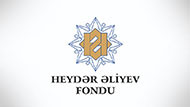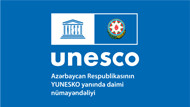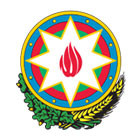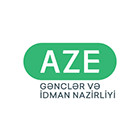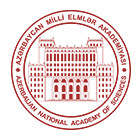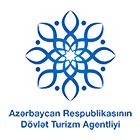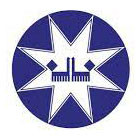International Conference "The Role of UNESCO Conventions Concerning the Protection of Cultural Properties and Aspects of Improving their Implementation". 6-9 December 2022. Baku, Azerbaijan
2022-12-06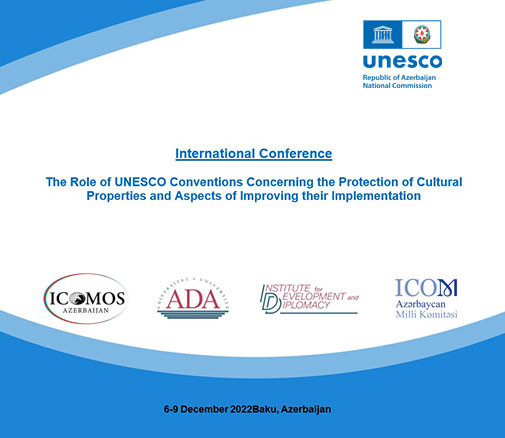
Background:
Historically, the protection of cultural properties has been of great importance for humanity and ensuring their international protection has always been one of the actual matters. Taking into account that cultural properties are more endangered during armed conflicts, the Hague Conventions of 1899 and 1907 and the Washington Pact of April 15, 1935 defined the principles for the protection of cultural properties during armed conflicts.
In the course the Second World War, the cultural properties were exposed to the threat of destruction as a consequence of serious damage to cultural properties and the development of military equipment, which necessitated the international community to create a new legal framework for the protection of cultural properties. In this regard, under the auspices of UNESCO, the "Convention for the Protection of Cultural Property in the Event of Armed Conflict" and the 1st Protocol additional to the convention were adopted at the Hague Conference of 1954.
However, during the late 1980s and early 1990s, the crimes committed against cultural properties demonstrated shortcomings in the implementation of 1954 Hague Convention prevailed. As a result, the 2nd Protocol was adopted in 1999 for the purpose of increasing the effectiveness of certain provisions of the convention.
Despite all of the abovementioned attempts, it is still not possible to completely ensure the protection of cultural properties during the armed conflicts, which is the case in the current ongoing armed conflicts in different parts of the world, as well as in the armed conflicts occurred in Afghanistan, Syria and Iraq.
Azerbaijan was one of the countries that experienced this bitter experience during the armed conflict. Although, along with Azerbaijan, Armenia has ratified 1954 Hague Convention, during 30-years of occupation of 20 percent of Azerbaijan’s internationally recognized territories by the neighbouring Armenia, cultural properties of Azerbaijan were looted, destroyed, vandalized and appropriated.
Abovementioned facts enable to highlight that there are still problems in the implementation of the 1954 Hague Convention and its additional Protocols, and it is necessary to take certain measures for increasing the effectiveness of the implementation of its provisions.
In addition to the dangers posed by armed conflicts, cultural properties are also exposed to the threat of destruction due to changes in social and economic conditions in peaceful times. For addressing this problem, under the auspices of UNESCO, the "Convention Concerning the Protection of World Cultural and Natural Heritage" was adopted in 1972. The main purpose of this convention is to ensure the identification, protection, conservation, presentation and transmission to future generations of the cultural and natural heritage.
However, there are certain shortcomings in the implementation of the convention due to the lack of mechanisms influencing the national legislative systems of states being member of 1972 World Heritage Convention. In particular, although the 1972 World Heritage Convention provides an opportunity to determine the duties and obligations of states in regard with the protection of cultural property, the states have a complete authority over the measures and decisions adopted for the protection of cultural heritage, which limits the implementation of the internationally accepted methods.
The challenges associated with the implementation of the above-mentioned conventions necessitate appropriate responses to ensure the protection of cultural properties throughout the world during armed conflict or peacetime.
Objective of Conference:
Azerbaijan is always committed to the fulfilment of obligations arising from the international conventions to which it is party. It is no coincidence that by the relevant decree of the President of the Republic of Azerbaijan, the Commission on the implementation of the provisions of the "Convention for the Protection of Cultural Property in the Event of Armed Conflict" was established. Azerbaijan was also elected a member of the Intergovernmental Committee for the Second Protocol of the 1954 Hague Convention of UNESCO for 2021-2025. Taking into account the aforementioned facts, Azerbaijan intends to contribute to the improvement of the implementation of the 1954 Hague Convention by holding this international conference.
At the same time, considering that this year marks the 50th anniversary of 1972 World Heritage Convention, Azerbaijan values the conference as an opportunity to emphasize the importance of the mentioned convention and to identify the development directions for its effective implementation.
Accordingly, the objective of the Conference is to identify the existing problems in the implementation of 1954 Hague Convention and 1972 World Heritage Convention and their responses. As a result of the discussions held during the conference, it is planned to prepare relevant recommendations for improving the implementation of the aforementioned conventions and submit them to UNESCO.
Organizational Structure of Conference:
Conference is organized into four parts:
• Opening ceremony
• Panel discussions
• Presentations
• Closing ceremony
During the conference, it is planned to present the publication, "Military guide to the protection of cultural property during armed conflicts" prepared by UNESCO with the support of the Republic of Azerbaijan.
Besides, the presentation of a book dedicated to the cultural capital of Azerbaijan - Shusha city will be held during the Conference.
Note: The working language of the conference will be English.
Participants:
The government officials, representatives of the international organization in the field of cultural heritage, local and foreign experts and scientists in the relevant field will be invited for the participation at the conference.
Note: Speakers are requested to submit the text of their speech to the organizing committee one week before the Conference. With the consent of the speakers, these texts will be published as a conference material.
Contact Persons
For any questions, please contact:
1. Mr. Eltay Aslanov, Second Secretary, National Commission of The Republic of Azerbaijan for UNESCO
Email: e_aslanov@mfa.gov.az
Tel: (+994) 12 596 93 86
2. Mr. Sanan Aliyev, Project Coordinator, National Commission of the Republic of Azerbaijan for UNESCO
Email: sanaliyev@gmail.com
Tel: (+994) 12 596 93 54
3. Ms. Sabina Amirova, Executive Assistant to Rector, ADA University
Email: samirova@ada.edu.az
Tel: (+994 12) 437 3235 ext. 322




